
Alpine Entomology
Scope & Guideline
Unveiling the Secrets of High-Altitude Insect Life
Introduction
Aims and Scopes
- Biodiversity and Taxonomy:
The journal extensively covers the diversity of insect species in alpine regions, providing taxonomic revisions, descriptions of new species, and checklists that enhance the understanding of local and regional biodiversity. - Ecological Dynamics and Interactions:
Research published in Alpine Entomology often examines the ecological interactions among insect species and between insects and their environments, including studies on habitat preferences, feeding behaviors, and mutualistic relationships. - Invasive Species and Conservation:
The journal addresses the impact of invasive species on native insect populations and ecosystems, contributing to conservation efforts by documenting new occurrences and assessing ecological consequences. - Molecular and Genetic Studies:
Molecular techniques, including DNA barcoding and phylogenetic analyses, are commonly employed to investigate species relationships, population genetics, and evolutionary patterns among alpine insects. - Impact of Climate Change:
Research often focuses on how climate change affects insect distribution, behavior, and ecology in alpine environments, highlighting the vulnerability of these ecosystems.
Trending and Emerging
- Molecular Phylogenetics and Barcoding:
The use of DNA barcoding and phylogenetic methods has surged, providing insights into species identification and evolutionary relationships, which are crucial for understanding biodiversity in alpine habitats. - Invasive Species Research:
There is a growing focus on the impact of invasive insect species, particularly their distribution and ecological effects in alpine environments, underscoring the importance of monitoring and managing these threats. - Climate Change Impacts:
Research exploring the effects of climate change on alpine insect populations and their ecosystems is on the rise, reflecting an urgent need to understand how these changes may affect biodiversity and ecosystem services. - Conservation and Habitat Restoration:
Studies aimed at conservation strategies and habitat restoration efforts in alpine regions are increasingly common, emphasizing the journal's role in addressing ecological challenges and promoting sustainable practices. - Ecological Interactions and Mutualisms:
There is a heightened interest in the ecological interactions among species, including mutualistic relationships and their implications for biodiversity and ecosystem functioning, indicating a trend towards holistic ecological research.
Declining or Waning
- General Insect Behavior Studies:
There has been a noticeable reduction in publications focusing solely on general insect behavior outside of ecological contexts, suggesting a shift towards more integrative approaches that combine behavior with ecological and evolutionary frameworks. - Historical Entomological Studies:
Research dedicated to historical accounts or long-term studies of insect populations has decreased, possibly due to a growing emphasis on contemporary ecological issues and urgent conservation needs. - Non-Alpine Insect Studies:
Papers focusing on insect species not endemic to alpine regions have become less frequent, indicating a narrowing of the journal's scope to prioritize research that is directly relevant to alpine ecosystems.
Similar Journals
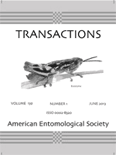
TRANSACTIONS OF THE AMERICAN ENTOMOLOGICAL SOCIETY
Charting the Course for Future Entomological Discoveries.TRANSACTIONS OF THE AMERICAN ENTOMOLOGICAL SOCIETY, published by the American Entomological Society, is a distinguished journal committed to advancing the field of entomology through innovative research and comprehensive reviews. With an ISSN of 0002-8320 and an E-ISSN of 2162-3139, this journal has been a vital resource for entomologists since its inception, showcasing significant findings in insect science as well as ecology, evolution, behavior, and systematics. Although currently not offering Open Access, the journal remains a pivotal platform for professionals, researchers, and students interested in the biological sciences related to insects. The journal's influence is reflected in its Scopus rankings, with a Q3 designation in Insect Science and a Q4 designation in Ecology, Evolution, Behavior and Systematics as of 2023. With a convergence of published years from 1993 to present, TRANSACTIONS aims to foster a deep understanding of insect-related topics, thereby contributing valuable insights that may influence both academic and practical realms within entomology.
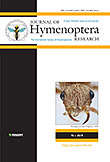
JOURNAL OF HYMENOPTERA RESEARCH
Fostering Innovation in Animal Science and EcologyJOURNAL OF HYMENOPTERA RESEARCH is a leading open-access publication dedicated to the advancement of knowledge in the fields of Insect Science, Animal Science and Zoology, and Ecology. Published by Pensoft Publishers since 2011, this journal plays a critical role in facilitating the exchange of significant research findings and insights related to Hymenoptera, a diverse order of insects that includes bees, wasps, and ants. With a commendable impact factor and ranked in the Q1 category for Insect Science and Animal Science, the journal stands out within the scientific community, drawing contributions from researchers globally. Boasting an ISSN of 1070-9428 and an E-ISSN of 1314-2607, the journal not only ensures broad accessibility to its content but also fosters a collaborative environment for professionals and students alike to engage with pioneering research. By reflecting on the converged years of 2007-2024, the JOURNAL OF HYMENOPTERA RESEARCH remains a vital resource for understanding the ecological and evolutionary dynamics of this important group of insects, solidifying its position as a cornerstone in entomological studies.

Insect Conservation and Diversity
Exploring the Wonders of Insect DiversityInsect Conservation and Diversity is an esteemed academic journal dedicated to the field of insect science, published by WILEY in the United Kingdom. With its ISSN 1752-458X and E-ISSN 1752-4598, this journal serves as a vital resource for researchers and professionals striving to advance knowledge in biodiversity and conservation. The journal holds an impressive Q1 ranking in both Ecology, Evolution, Behavior and Systematics and Insect Science as of 2023, which reflects its rigorous peer-review process and significant contributions to the field. Recognized for its high-quality publications, Insect Conservation and Diversity ranks 9th out of 181 in insect science and 72nd out of 721 in ecology within Scopus, placing it in the top tiers of academic journals. Researchers are encouraged to submit their work from 2009 to 2024, enhancing our understanding of insect biodiversity and conservation strategies. Aimed at fostering advancements in knowledge and collaborative efforts, this journal is essential for all those committed to the study and preservation of insect diversity.
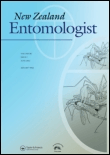
NEW ZEALAND ENTOMOLOGIST
Bridging Past Insights with Future Innovations in EntomologyNEW ZEALAND ENTOMOLOGIST, published by Taylor & Francis Ltd, is a distinguished journal in the field of Insect Science, featuring a rich history dating back to its initial publication in 1952. As a platform for sharing innovative research and critical insights, this journal serves as a vital resource for entomologists and scientists interested in the diverse aspects of insect biology, ecology, and behavior. Although it currently holds a Q4 category in its discipline with Scopus ranking it at the 163rd out of 181 journals, the NEW ZEALAND ENTOMOLOGIST continues to uphold high-quality standards of peer-reviewed articles that contribute significantly to the understanding of insects, particularly within the unique ecosystems of New Zealand. Researchers and professionals are encouraged to submit their findings to enhance the journal's growing repository of knowledge, while students will find a wealth of information to aid their studies and foster their interest in entomological research.
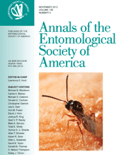
ANNALS OF THE ENTOMOLOGICAL SOCIETY OF AMERICA
Elevating Knowledge in Agricultural and Biological SciencesANNALS OF THE ENTOMOLOGICAL SOCIETY OF AMERICA is a premier journal dedicated to advancing the field of insect science, published by Oxford University Press. With an impressive impact factor and classified in the Q1 quartile for its category, this journal ranks among the top publications in agricultural and biological sciences, specifically within insect science, positioned at #28 out of 181, indicating its significant influence and high-quality research contributions. The journal aims to disseminate original research, comprehensive reviews, and groundbreaking findings that enhance our understanding of entomology, spanning across ecological, evolutionary, and applied segments. With a consistent publication history since 1938, researchers, professionals, and students will benefit from the wealth of knowledge presented in its pages. Although the journal does not currently offer open access, it remains a vital resource for those seeking to stay at the forefront of entomological research and innovation.
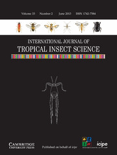
INTERNATIONAL JOURNAL OF TROPICAL INSECT SCIENCE
Connecting Scholars in Tropical Insect ScienceINTERNATIONAL JOURNAL OF TROPICAL INSECT SCIENCE, published by Springer International Publishing AG, is a leading interdisciplinary journal dedicated to advancing knowledge in the fields of insect science and ecology. With its ISSN 1742-7584 and E-ISSN 1742-7592, this journal provides a platform for researchers to publish high-quality, peer-reviewed articles that explore various aspects of tropical insect biology, behavior, and their ecological impacts. As evidenced by its Q3 ranking in both Ecology, Evolution, Behavior and Systematics and Insect Science, it plays a vital role in fostering scientific dialogue and innovation within these disciplines. Researchers affiliated with the journal benefit from its visibility and growing impact, as demonstrated by its Scopus ranks, with a percentile standing of 61st in Insect Science. Although the journal is not open access, it still reaches a wide academic audience, making significant contributions to our understanding of tropical ecosystems. Situated in Switzerland, this journal is crucial for students, professionals, and researchers invested in the intersection of entomology and ecological science.
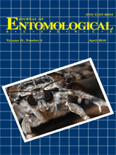
JOURNAL OF ENTOMOLOGICAL SCIENCE
Exploring the Frontiers of Insect ScienceJOURNAL OF ENTOMOLOGICAL SCIENCE, published by the Georgia Entomological Society Inc, is a crucial resource in the field of insect science and ecology. With a rich history since its inception in 1993, the journal provides a platform for innovative research and comprehensive reviews addressing various aspects of entomology. Although not an open-access journal, it is highly regarded within its community, holding a Q3 ranking in Agronomy and Crop Science, Ecology, Evolution, Behavior and Systematics, and Insect Science as of 2023. Each issue promises to contribute valuable insights to professionals, researchers, and students alike, making it an essential publication for those looking to stay abreast of developments in entomological studies. The journal's editorial commitment ensures that it remains at the forefront of entomological research through rigorous peer reviews and a dedication to scholarly excellence.

FRAGMENTA ENTOMOLOGICA
Cultivating insights in the realm of entomology.FRAGMENTA ENTOMOLOGICA is a prominent peer-reviewed academic journal published by UNIV DEGLI STUDI DI ROMA LA SAPIENZA, focusing on various dimensions of entomology and insect science. With an ISSN of 0429-288X and an E-ISSN of 2284-4880, this journal has embraced an Open Access model since 2006, ensuring that valuable research is widely accessible to the global scientific community. Based in Italy, at the DIPARTIMENTO DI BIOLOGIA ANIMALE E DELL'UOMO in Rome, FRAGMENTA ENTOMOLOGICA is recognized for its commitment to high-quality research, ranking in the Q3 category across multiple categories, including Ecology and Insect Science, in 2023. Its Scopus rankings further underscore its relevance, showcasing its role in advancing knowledge in the fields of Ecology, Evolution, and Insect Behavior. This journal serves as an essential resource for researchers, professionals, and students interested in the intricate world of insects and their ecological roles, fostering academic discourse that bridges theoretical and practical entomological studies.
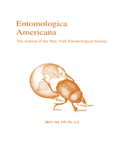
Entomologica Americana
Bridging Science and Conservation in EntomologyEntomologica Americana is a pivotal journal in the field of Insect Science, published by the esteemed New York Entomological Society Inc. With its ISSN (1947-5136) and E-ISSN (1947-5144), this journal serves as a critical resource for researchers, professionals, and students dedicated to the study of entomology. Although it is categorized in the Q4 quartile for Insect Science as per the 2023 Scopus Rankings, where it ranks 179 out of 181, it continues to provide valuable insights into various aspects of insect biology, ecology, and conservation. The journal has been actively publishing since its convergence years from 2009 to 2017, and in selected years thereafter, including 2019, 2021, and 2023. Located at the iconic American Museum of Natural History in New York City, Entomologica Americana is a testament to the ongoing exploration and understanding of the insect world that underpins biodiversity and ecosystem health. Although it does not operate under an Open Access model, it offers a vital platform for scholarly communication and the dissemination of research findings, making it indispensable for anyone involved in or entering the fascinating field of entomology.
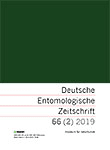
DEUTSCHE ENTOMOLOGISCHE ZEITSCHRIFT
Unlocking the Secrets of the Insect WorldDEUTSCHE ENTOMOLOGISCHE ZEITSCHRIFT is a premier open access journal dedicated to the vibrant field of entomology, proudly published by Pensoft Publishers. With a rich publication history dating back to 1954, this journal serves as a vital platform for disseminating high-quality research in Animal Science, Zoology, and Insect Science, currently holding a commendable Q2 quartile ranking in these disciplines. The journal embraces the accessibility of science, having transitioned to an open-access model in 2014, ensuring that all readers can engage with cutting-edge findings and innovative studies without barriers. Researchers, professionals, and students alike will find the journal's breadth of topics—ranging from basic ecological studies to applied entomological research—essential for keeping abreast of developments that impact biodiversity and ecosystem functioning globally. With its commitment to supporting the entomological community, DEUTSCHE ENTOMOLOGISCHE ZEITSCHRIFT remains a cornerstone for anyone interested in the intricate world of insects.